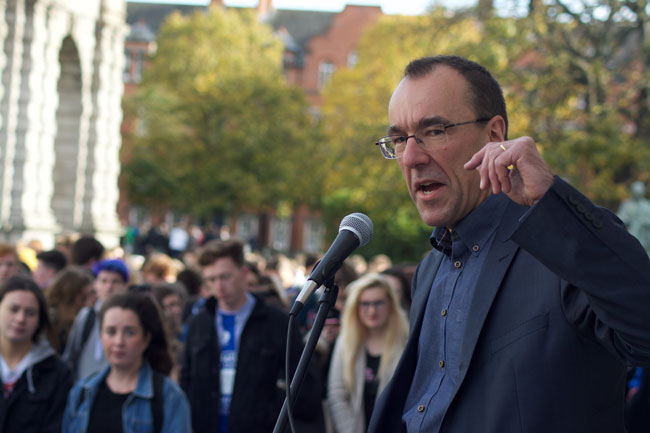Beginning in 2009, I spent five years as the Chair of the Compliance Committee of the Broadcasting Authority of Ireland, the body which, among other things, deals with complaints about radio and television broadcasting – and that experience taught me something about freedom of speech.
Many of the cases that we dealt with in the Broadcasting Authority revolved around news and current affairs, and as divisive issues heated up, we braced ourselves for an influx of (often-fascinating) complaints from viewers who felt that something they had seen or heard was unfair. Over time, I began to realise that, on the whole, the Irish people have a deeply embedded sense of fairness. There may be any number of reasons for this, historical or cultural. However, at least when it comes to broadcasting, there is also a key piece of legislation that has become part of who we are as a society: the 1960 Broadcasting Act.
And, to be more precise, Section 18 of that act, which stipulates that when a broadcaster – there was only one in those days – presents “any information, news or feature which relates to matters of public controversy or is the subject of current public debate, the information, news or feature is presented objectively and impartially and without any expression of the Authority’s [ie the broadcaster’s] own views”.
Without two sides, there would have been no debate, and without a debate, broadcasters would have been unable to cover the issues in any meaningful way
It’s only a few lines, but those few lines – and the corresponding sections in subsequent broadcasting acts, which added the concept of “fairness” – would have a profound shaping influence on public debate in Ireland over the past 60-odd years.
In practice, Section 18 meant that when a “matter of public controversy” was being discussed, either the broadcaster had to find voices who could speak up for the opposing sides of a question, or the broadcaster had to take one side themselves. Historically, the effect this had on Irish culture in the 1960s was profound. Before 1960, if someone wanted to say, for instance, that incarcerating unwed mothers was a good idea, there was no onus on a broadcaster – and correspondingly not a lot of appetite in the print media – to ask if this was really true. After 1960, there was a legal obligation to ask the difficult questions, and that changed everything. At the stroke of a statutory pen, public debate in Ireland became precisely that – a debate.
If you want to see what happens when you take this away, you need only look to the US. There used to be an equivalent piece of legislation in the US, the Fairness Doctrine, which was enacted in 1949. It was effectively repealed in 1987, under the Reagan administration, ostensibly on the grounds that it curtailed free speech. If we want to find a source for the coarsening and dangerous polarization of public debate in the US over the past 30 years – and its current effects in the US today – repeal of the Fairness Doctrine is a good place to start, long before we start blaming social media.
I was working with the Broadcasting Authority when the marriage equality referendum got underway. When the campaign first got underway, it looked for a time as if the main issue was not going to be that arguments were going to be overheated, but that there was going to be no argument at all. In the initial stages of the campaign, it looked as if there was going to be difficulty in finding anyone willing to put their heads above the parapet and take the opposing view.
As members of a community of learning, for whom rational debate should be a guiding principle, it is only right and proper that all Trinity students should take a view on the matter
Without two sides, there would have been no debate, and without a debate, broadcasters would have been unable to cover the issues in any meaningful way that would have allowed the undecided to make up their minds in an informed way. In the end, the ground of the campaign moved to territory where debate was possible, and having heard both sides, the electorate were able to make an informed, rational decision. That’s how democracy should work.
In the upcoming debate on the proposed repeal of the eighth amendment, a lack of opposing voices is unlikely to be a problem, if past experience is anything to go by. However, we do need to make sure that all voices are heard. If we think of the university as a kind of microcosm of a state, it’s worth keeping the long-term societal effects of a “fairness doctrine” in Irish culture over the past half century – and the corresponding counter example of its repeal in the US over the past 30 years.
Debate over repeal of the eighth amendment is raising complex ethical and moral issues. As members of a community of learning, for whom rational debate should be a guiding principle, it is only right and proper that all Trinity students should take a view on the matter, and many have already developed carefully considered positions. However, taking a view is of little use if that view can’t be heard or debated. So, regardless of anyone’s view on the particular issues arising from debate over the proposed repeal of the eighth amendment, if we want to belong to a community founded on rational decision-making, there is a fundamental right that everyone in Trinity needs to embrace in the months ahead: the right of those with whom we disagree to be heard fairly.
Prof Chris Morash is the Vice-Provost of Trinity College Dublin.







